Love of The People
“As a general rule, we care for some and do not care for others.” Tales of Ise; 10th c Japan
“Love means nothing if it does not mean loving some people more than others.” George Orwell
Love of Mankind – all eight billion of them - is a difficult thing to talk about in the abstract; difficult to strike a balance between mawkishness on the one hand and cynicism on the other. I wrote a piece on the subject in 2009: The Seductive Appeal of Loving Strangers and my essay this month is a melding of the text of that one together with my further thoughts now fifteen years later. “What survives of us is love” - one of the poet Philip Larkin’s most famous lines - is famous because it has such resonance although I’m guessing the poet’s intention was less schmaltzy than has gone down in the annals of poetry one-liners.
Love of Thy Fellow Man is at the root of the ancient tree of Christendom from which all eras of our two thousand year history have branched - our 21st c. hyper-liberal one included. And it is my decidedly lay impression that, whilst the precise formulations may differ, ‘Love thy neighbour as thyself’ and ‘Love all those whom God has made’ is common to all the world’s major religions. And most of us I imagine are broadly sympathetic to the principle of universal human fellowship - even if – as in Hamlet’s words to Horatio - it may be “more honour’d in the breach than the observance”. More sympathetic anyway than to its opposites – genocide and holy war.
The seriously devout may hold fast to religious teachings as absolutes (or convince themselves of this) but, for the great mass of us Westerners with our Enlightenment-rationalist mentality, the literal injunction to love everyone is a bit of a stretch. Me..I love my friends and family (most of the time). And my fellow man?....well I feel strongly well-disposed to about 10% of them (ish) – 5% maybe. The next 60% or so I can rub along with, somewhere between cordial and indifferent. And the remaining 30%?...somewhere on a scale from mildly dislike... to despise... to dread.
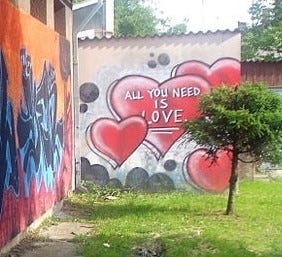
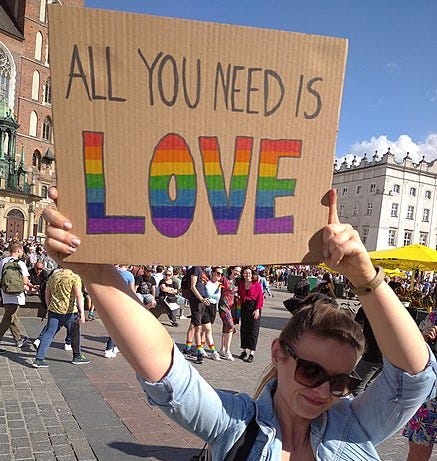
There was a weird outbreak of Universal Love that coincided with my teenage years. The Hippie thing... All You Need is Love and so forth. It was a big youth-cult thing for a while (even the bad-boy ‘Stones got in on it) but I think pretty much everyone knew in their heart of hearts how shallow it was.
This brings me to the main theme of this essay. Which is to argue that mass urban society - with its illusion of a quasi-relationship with billions of our fellow man - has seriously over-extended and attenuated our natural fount of fellow feeling. I’m not talking about hypocrisy here....that is something else. I’m talking about self-deluding.
Broadly speaking - as 20th century technological wizardry rolled out over the old verities of Christendom - the Universal Love moral imperative came to be re-imagined as Social Justice. This shares many characteristics with the old religion. A big part of the pull of the Social Justice religion (as with all the Abrahamic religions) is the salvation it promises. No you don’t get to go to Heaven but you do get to feel very virtuous. And so much more so than your ‘uncaring’ redneck peers. Thus has it become (for everyone other than intellectual contrarians) a 21st c. article of faith; existing on a rarefied plane beyond the scope of political/philosophical interrogation. Disrespecting it is blasphemy...as in “So you don’t care about injustice then?!”
And I am about to disrespect it and argue that it is a flimsy kind of religion. A moral and philosophical flimsiness spread out on a global canvas.... and a heavenly kingdom with bureaucracy hard-wired into it. But before I release the beast, let me say this. The people I have come to know and respect in my own walk of life (colleagues; neighbours etc) have mostly been ones for whom a belief in Social Justice is a given. But this hasn’t seemed to get in the way of their caring for their real (as opposed to notional) loved ones or their acquisition of wisdom about real human relationships. I cannot be as generous however about Social Justice as a moral compass for navigating the abstract moral/philosophical puzzles that mass-mediated Western liberalism has thrown up.
When I originally wrote my 2009 essay, our 21st c. post-Christendom was fifteen years younger....and I was fifteen years younger. Events unfurl so fast in Digitopia these days don’t they? Those times when everyone was still fairly ‘binary’ and online human history still had white people in it already seem long ago. Joking aside, how different were things then Universal Love-wise? Not so great either really – at least not from a conservative perspective.
It seems to me that class inequality used to get a slightly bigger slice of Social Justice rhetoric though not any more of its redistributive reality. On the other hand, we were (from the perspective of current pieties) collectively blind to the plight of the millions of TQIA+’s with whom we apparently share the planet. In those days, our empathy with (and ‘pride’ in) the’ LGB’ ‘community’ pretty much exhausted our collective font of compassion for the sexually dysphoric. But the winged chariot of Progress was coming up fast in our rear-view mirror. [Confession: I haven’t even looked up what the IA bit of the LGBTQIA acronym stands for.]
But the Social Justice religion’s most enduring missionary work on its benighted Western fellow men has been in the field of what I would call its White-Intelligentsia Guilt-Trip-by-Proxy Syndrome. The chattering class, civil lawfare against their deplorable white fellows - for crimes of Euro-centricity and whiteness - grinds on like a 21st c. Dombey & Son. And thanks to fifteen year’s more expansion of tertiary education, the prosecution team has grown.

.....and groan. Now without further ado, here is the first tranche of a dusty, misanthropic muse of an Englishman approaching his 60th year in 2009.
The Seductive Appeal of Loving Strangers (2009)
People who live on another continent make for a love interest that is both exotic and - at the same time - safe. Also people who inhabit housing estates, relatively close to you in a geographical sense but inhabiting a social and cultural universe so remote from yours that you can romanticise them to your heart’s content without having to risk much actual social contact - apart from in the airport lounge or the subway maybe – and then only for a bit. These are people with comical but endearing vulgar habits and notions. Oh but so salt-of-the-earth and such victims of the system. Victims which we, of course, (by voting Left) are all doing our utmost to change. Funny how it (inequality, exploitation etc) never does change somehow, in spite of the utmost that middle class Progressives have been doing for more than a hundred years now.
Love may be a many-splendored thing but in reality it is also (like everything) a hierarchical thing. At its apex is the love whereby the other person’s wellbeing is fundamental to your own and something that you take deep personal responsibility for – like your spouse and your children. (And in times of war perhaps, in the heat of battle, also your comrades in arms.) Then there’s family that you care about but whose fate is largely independent of your own. And close friends; people you have mutually-selected from all the other passing ships. Then there are those individuals who gladden your heart and fill you with admiration even though you may never have known them personally.
And then there is Love in the Abstract: Love of complete strangers. Western lefty liberals love almost everyone – all 8 billion of them. With exceptions of course. Exceptions might be white people or males or both (unless they are ‘dishy’ like George Clooney for example). You cannot, of course, be of any actual, realistic use to those abstract objects of your Love but along the way you can – by unfavourable comparison - really diss the more proximate objects of your displeasure. For sentimentalising one party often entails demonising another. Loving strangers is a great way of working through your resentments against people of your own kind but a bit more successful than you.
Which brings us to Hate in the Abstract and in particular Theological Hate: Some people (terrorists for example) hate whole great categories such as infidels or women who don’t obey them slavishly behind their burkhas. Or Jews. And they not only hate them but think that they deserve to be killed. But the bleeding heart liberals among us love those terrorists too. Other people (mostly white ones bizarrely) hate everyone who is deemed to have been the beneficiary of ‘White Privilege’.
Occupy Wall Street was one of this kind wasn’t it? Here is a wickedly cynical take on the phenomenon that some clever wag has dubbed as Misery Tourism. (It was written not long after my 2009 essay.):
New York police have lost patience with Occupy Wall Street. Chanted slogans turn into girly shrieks as cops squirt Mace in protesters’ eyes and push them up against a barricade. The scene is witnessed by a young British woman – small, bustling, self-important – who taps angry tweets into a mobile phone before rushing back to her hotel to write a blog post. Welcome to misery tourism, a sort of Gap Yah for well-heeled Lefties.... information technology enables self-styled “activists” and “photo-journalists” to flit from trouble spot to trouble spot. Passport? Check. Smartphone? Check. Loan from mummy and daddy? Check. Congratulations: you’re a humanitarian. (Harry Flashman Telegraph blogs 2011)
Doing Good
Social Justice activism (like its older sister Do-Gooding) can sometimes invite mockery, as in this 2013 Spectator portrait by Jonathan Foreman of the phenomenon of posh ‘gap year’ foreign aid:
Aid work is attractive because of the adventure and the thrill of danger. To others, the lure is endless gap-year exoticism and third-world partying (with the additional benefit of being one of the good guys)... Clare Lockhart, author of Fixing Failed States, likens the aid world to the Victorian church, which offered employment and status to the second sons of the landed gentry. And certainly, if you visit the bars and clubs frequented by aid workers in many parts of the third world, you could be forgiven for seeing the aid business as a sort of white-knuckle dating agency for middle-class Westerners. For the more academic, it’s also a ticket to the lucrative five-star conference circuit...... The Notting Hill elite is more likely to encounter or engage with poor Africans on their holidays, or working trips abroad than to encounter rock-bottom life at home. They’re more likely to have visited Kenya than Rochdale..... Their gap years prepare them for philanthropy in foreign parts, but not to confront life in a British sink estate.
As you will see if you read the whole piece, it is primarily a diatribe against the Tory Cameron government’s spendthrift obsession with foreign aid given that they must have known that “development aid is at best useless and at worst counterproductive. A quarter of Britain’s foreign aid goes.... into the treasuries of some of the world’s least competent, honest or responsible governments.” And “Cameron and his crew must have noticed that the fiercest defenders of aid are invariably white, and the most trenchant critics tend to be African intellectuals like Ghana’s George Ayittey and Uganda’s Andrew Mwenda.” I will qualify it by noting that there will be at least some young folks with deeper and genuine – if youthfully naive - philanthropic urges than are portrayed here.
The Seductive Apeal of Lovoing Strangers (cont.)
It could be said that this fashion accessory kind of Love is so skin deep that it hardly matters. The academia sheep-dipped souls that are caught in its psychological web – the tens of millions (hundreds of millions?) of them – are probably more peaceable, law-abiding, tax-paying, loving-parenting citizens than at any time in history. So what if they are also just a bit full of crap?
But their notional Utopia won’t come until and unless there is a whole lot more love in the world. Not until there is some kind of generalised Love for all those persons who inhabit one’s own real, proximate everyday life. Never in other words. Bleeding heart Love for Strangers meanwhile, only makes matters worse. Why? Because it outsources caring and gives it over to the state so you don’t have to bother with it. (I know a woman who actually rails against voluntary acts of charity and despises them as enemies of Progress.)
Utopia, for me, is a place where a spade is called a spade. It is a not unkindly place by any means; indeed one where almost any human failings would – short of gross physical violence – be accepted with a sigh. They would not however be selectively lionised as in our current Social Justice utopia.
I too love some strangers, in a way, if one is talking of that kind of Love. But none of mine are abstractions - like The Poor or some other victimhood construct that I can leap to the hypothetical cause of on social media. The ones I care for are real people with names and exceptional achievements. Too many to name - Handel, Beethoven, Einstein, Shakespeare....kind of thing. Also the great engineers of the technological wonderland that we inhabit in the West and entirely (most of us) take for granted. Whilst I do not love them exactly, I do hugely warm to them. But I do not bleed my heart all over them for 15 minutes of my precious time. Other people seem to love footballers and ‘celebrities’; Christ knows why. Blessed are the multi-millionaire celebrities....who care about the world’s unfortunates.
[An aside: A good way (in my view) to enrich one’s empathy for one’s fellow man beyond the shores of one’s own direct experience is by reading quality imaginative fiction.... novels (plus movies at their very best). Much richer and more ‘real’ than current affairs journalism.]
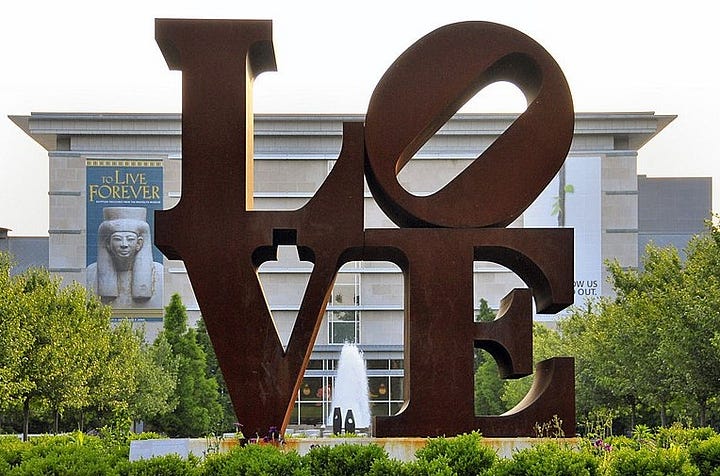
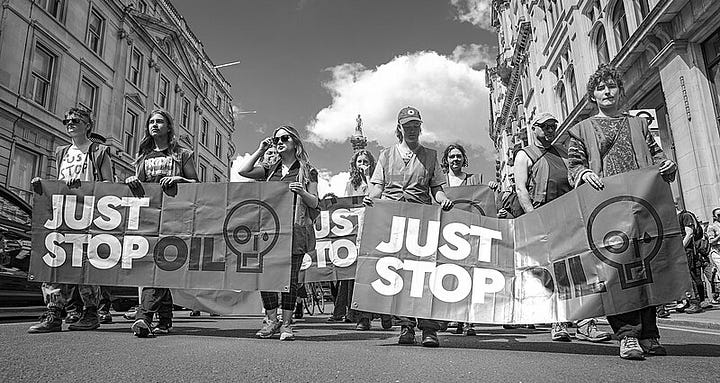
But What about Me?!
The last fifteen years have seen this Abstract Love spread its net ever wider. For example - to the list of xyzists that decent people should never, ever be (sexist, racist etc) and ‘phobias’ nice people should not have – has been added Fattist and Fatphobia. Yes, in the outer reaches of hyper-liberalism, even obesity has been added to the list of sanctified identities. Witnessing this total abrogation of personal responsibility (and outsourcing of it to Social Justice) can tip otherwise sane people from exasperation to outright contempt. As in this from Josh Slocum's Substack:
“.They’re everywhere. They serve you coffee and lunch at the diner. They’re blocking the aisles at the grocery store.....They’re the primary school teachers. They’re the librarians.
....Most of them are enormously fat. Not overweight. Fat enough that you can hear them struggling to breathe. As they order the two-person meal at the local restaurant (while overfeeding their children so they turn into goblins, too). This morning one of them took up the whole aisle at the corner store, piling Combos, Starbucks sugar drinks, and bags of Funyuns into her arms until half the pile tumbled to the floor..... This is what it’s like in blue American cities today. This is new normal. It’s a psychiatric freak show that you are not allowed to notice is a psychiatric freak show. It is the Twilight Zone episode “Beauty is in the eye of the beholder.”.”
Talk about calling a spade a spade!......I think I’ll leave it there.




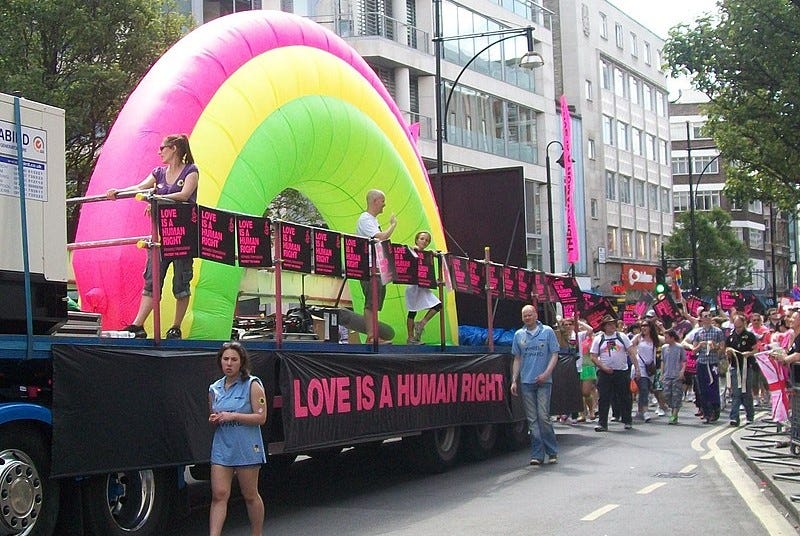

What follows is some useless advice, because most advice is useless. It's worth exactly what you paid for it:
Yes everything is easy in the abstract. Loving everybody sounds good, but means nothing. Humanity is great in the abstract, it's human beings who are problematic. Hell is other people according to an old depressed French man. It's more difficult to love somebody with imperfections and human frailty. You can't love everybody, but try to hate as few people as you can. Not necessarily because they don't deserve it, but because it will make you unhappy.
What gives life meaning may vary somewhat from person to person. I find I'm happiest when I do something useful for somebody else. If fulfills my sense of purpose. I don't think that's particularly unique. I don't find personally that there are entirely satisfactory solutions to most of life's problems. There are a series of challenges and dilemmas to be confronted and dealt with as best we can. When you successfully navigate a rough patch, that feels good. Sometimes it's enough to be standing after the storm. . But I think there are small answers that can be functional and enriching. It usually means getting back to basics. Having a lot of stuff past a certain point won't make you that happy. Everything past that point is of marginal utility. Billionaires aren't particularly contented people. They never have enough. Learn to understand what enough is for you. You can't take it with you and you are leaving. Try and find a few people you like and a few people you love and hang on to them. Easier said than done. Learn to forgive yourself and then you can forgive others. Easier said than done. Try to make your way forward without shoving other people out of the way. Stand up for yourself, but don't beat other people down. Easier said than done. Be persistent and concerned about quality - quality of work, quality of life, quality of relationships. Don't invest in one way relationships. It's a bad idea. On the other hand, don't get frustrated and toss things aside easily. There is satisfaction in taking care of people and other things. You have to put up with a certain amount of crap, but not more. You decide what your tolerance is. If it's making you miserable, it's too much crap. Evade toxic people. Evade emotional vampires and narcissists. Evade boredom. It's up to you to make your life interesting. If you have extra - extra money, extra love, extra time or skills, give it to somebody who needs it. It can be somebody you already know. It can be a new person or cause. You will get more back than you put into it often.
As far as strangers and "victims", some people are going to have a bad time of it and you aren't going to save them. A lot of these people don't want to be saved. If they wanted to be saved, they'd save themselves. Be kind, be generous, but don't be stupid. You can't take care of other people until you take care of yourself. Don't do stuff for extrinsic reasons, for acclaim or social acceptance. Do stuff that means something to you.
Do difficult things. Struggle is growth. Once you learn how to struggle, it's easier to get through the struggle to the other side regardless of the struggle. Emulate people who have successfully surmounted difficulty. Courage and persistence will go a long way as you build your skill set.
Good post.
I think, as a society, we are failing to realize, much less come to grips with, what is happening with regard to the religious void developing in the West. The crazy times* are here because many of us have turned our backs on religion, which to most of us was the primary source of “right & wrong”.